PhillyMan
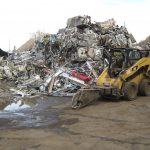
The Scrapping Life – R. Fanelle’s Sons Recycling
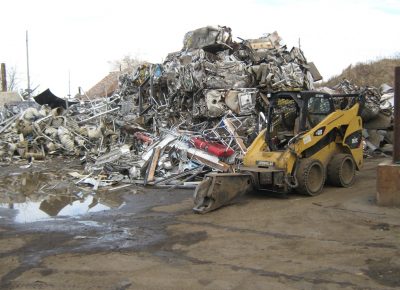
The Fanelle family no longer owns and operates their Camden-based scrap metal recycling service, but they had a great run…serving the scrapping community from their Camden location for over a century.
I had a chance to interview Tom Fanelle, the third-generation owner of R. Fanelle’s Sons, for the February 2015 issue of JerseyMan. You can view the PDF from the magazine here.
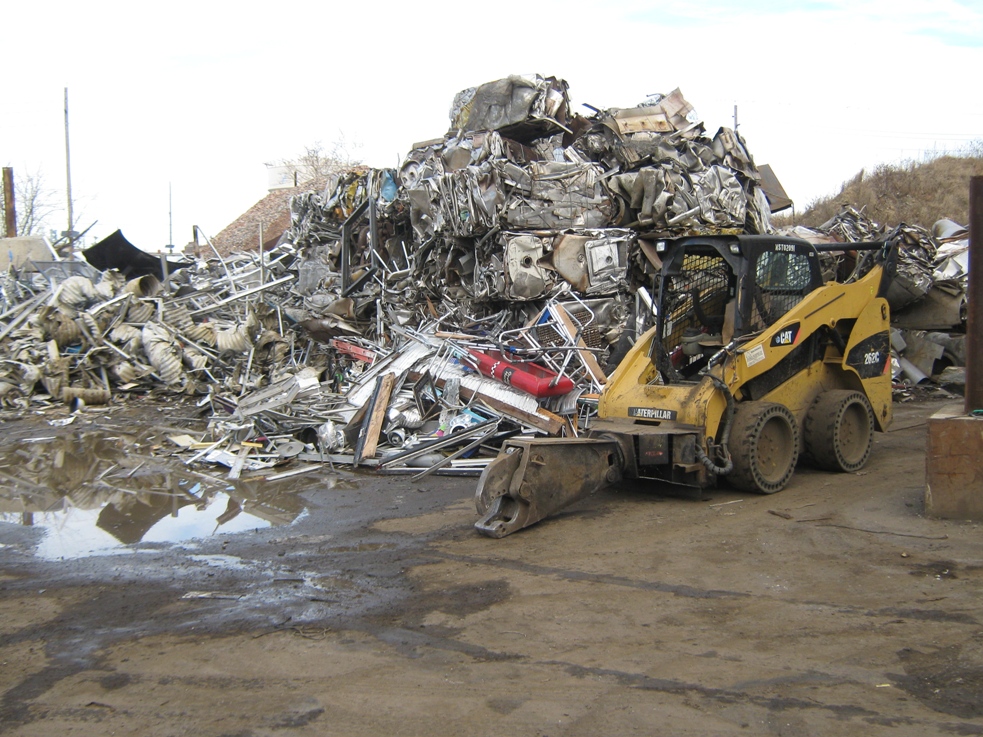
There’s money to be made in this stuff.
The Scrapping Life
Tom Fanelle will recycle and re-sell just about anything metal, but he has limits.
For instance, don’t try to sell him your prosthetic leg.
“One day,” he explains, “Two guys come in. One guy walks in, the other guy is hanging on to his back. The guy hanging on has no legs. The guy in the front is holding a titanium prosthesis, and he said do you buy titanium? It was the other guy’s leg! One of his two legs, we don’t know what happened to the other one. We threw him out.”
However, he did take the gun that killed Gianni Versace.
“After they investigated Versace’s death, they transported the gun up here; this was a national facility, so the FBI got involved. They did the investigation, they were done with the gun, and they contacted the owner because it was stolen.
“She said, ‘I just want the gun destroyed.’ Philadelphia FBI, Cherry Hill, I had them all here, we had coffee and donuts, we cut the gun and I picked up the pieces. I have them here somewhere. Just for the sake of saving it, not that I would sell it or anything.”
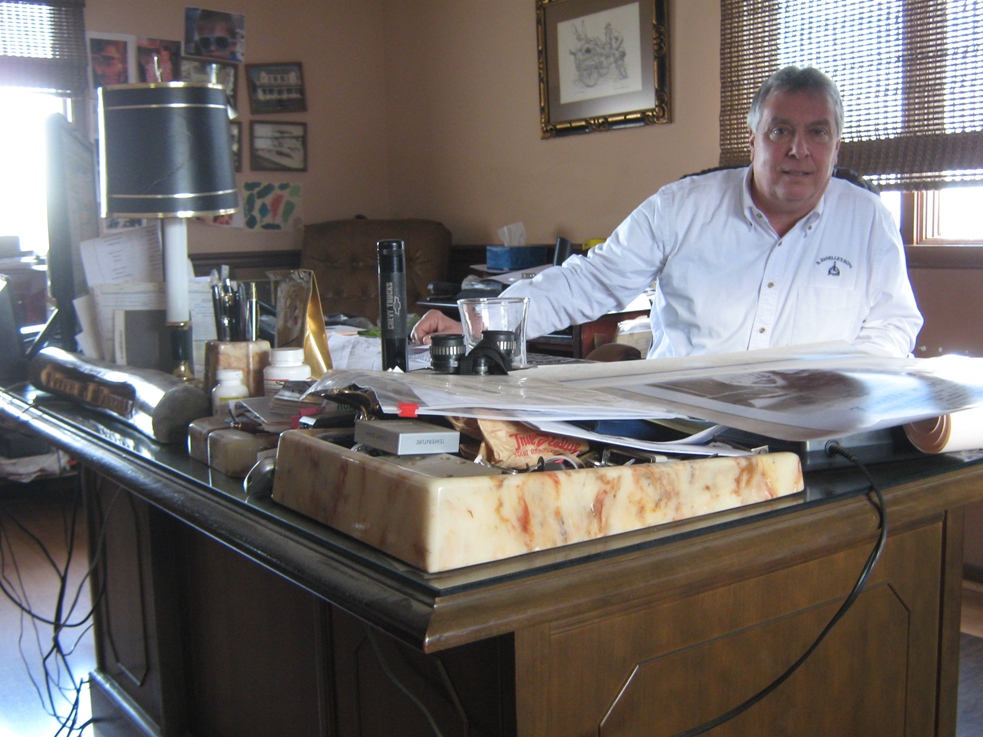
Tom Fanelle, carrying R. Fanelle & Sons past 100 years.
Tom Fanelle is the third-generation owner of R. Fanelle’s Sons Scrap Iron & Metal, a Camden-based recycling scrapyard. R. Fanelle’s Sons recently celebrated an impressive milestone…100 years of recycling metal in South Jersey. No small achievement in an industry with its share of mergers and acquisitions, but Fanelle would tell you that’s been part of their strength.
“We have the personal touch here,” he proudly notes. “If someone calls, they’re talking to me.”
The “R” in R. Fanelle stands for Rocco, Tom’s grandfather, who started the business in 1914. Rocco emigrated from Accettura, Italy, at the age of 18. After a few years working in the rag business with his uncle Donato, Rocco went into business for himself.
“He got a pushcart, walked around the streets and collected scrap,” Tom says. “In those days, there was an assortment of things they used to recycle. They recycled rags, they recycled bones, they recycled dog feces, believe it or not. They recycled paper, metals, things like that. After a few years, he had people come on board, and he had two, then three pushcarts. They would go collect and bring it back to him; he was the home base for collections.
“In the 1930s or 40s, they started buying trucks. For I think three or five dollars a day, different vendors would come and rent the trucks, and now they were able to reach into the suburbs.
“Business flourished during the 50s; it was a good time because we were so industrialized. RCA was one of our main customers. As businesses have died, other businesses have come up since. There’s always some demand, even though manufacturing is down considerably in South Jersey.”
Today R. Fanelle’s Sons serves three types of customers. There are industrial businesses like refineries and chemical companies; commercial businesses like road and demolition contractors; and peddlers…the “mom and pops”, Fanelle says, people with pickup trucks who make their living bringing in scrap metal they find.
When asked if it’s something like Pawn Stars, he shakes his head with a chuckle.
“I always use that as an example, but no. The Pawn Stars people negotiate price, here we have firm prices. Once something is identified as being a certain type of material, it has a price that goes with it. Everything is based on market conditions.
“It’s funny because a lot of people come in and say, ‘Well, I can get ten cents more up the street’. Well, so be it, if that’s what you want.”
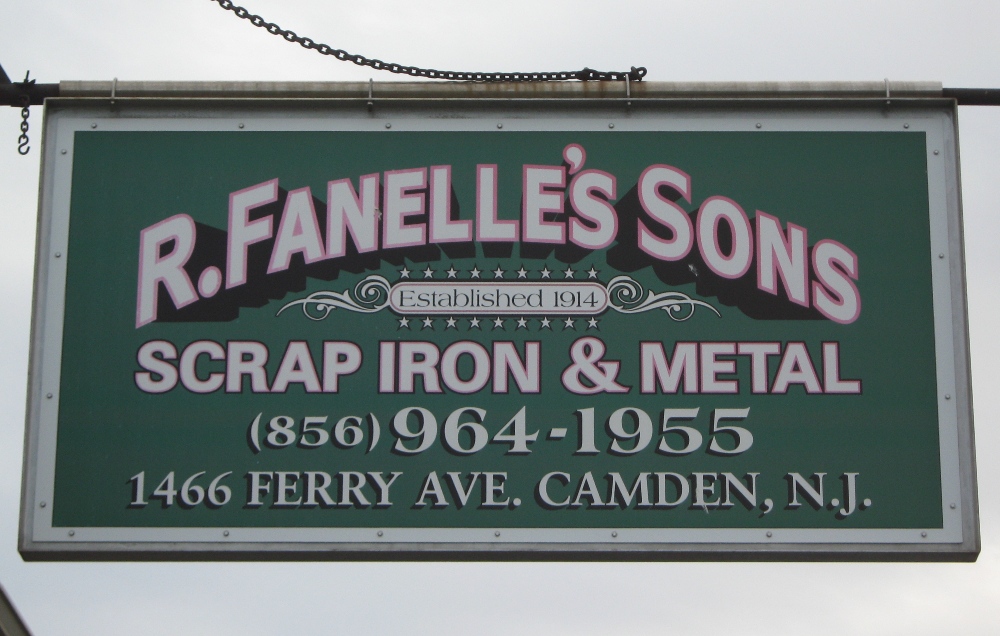
A South Jersey Institution since 1914.
Fanelle doesn’t spend time worrying about competition. His customers return, he says, because of the store’s good name. The challenge is maintaining a balance between servicing customers and protecting against metal thieves.
In recent years, the New Jersey state legislature passed bills requiring tougher restrictions on scrap metal dealers. Among the new standards were requiring dealers to pay by check and provide daily records to the state of each transaction. Dealers would also be required to report license plate numbers of anyone bringing scrap to be processed. Both bills passed the legislature but were vetoed by Governor Christie.
Fanelle was quoted in the Gloucester County Times opposing the bills. His concerns were the privacy of his accounts and the nature of his relationships with smaller customers. Otherwise, he didn’t have a problem with most of the legislation.
“Most of the things they tried to enforce, we do. We do photo ID, the license plate number, and everything we buy is documented and associated with a picture ID,” he says.
“One of the things was that they wanted us to stop paying by cash. Well, a lot of these people, they’re hardworking people and they work hand to mouth. They need the money today, the legitimate ones, anyway.
“If my competition does it, that’s fine. I don’t just mean New Jersey, I mean Pennsylvania, Delaware, because that’s what will happen. If you can’t pay by cash, people will go where the cash is.”
Fanelle also points out the problem with daily records. “My complaint was two things: one is, are you going to hire someone to review these every day? They’re available if you need them.
“The other thing is that I have a customer base. What if someone is reviewing my customer base and they have a friend in the business? They can go to their friend and say, Fanelle is buying scrap copper from this guy, why don’t you go see him? My base, I think, is kind of private, and they shouldn’t have that unless they need it.”
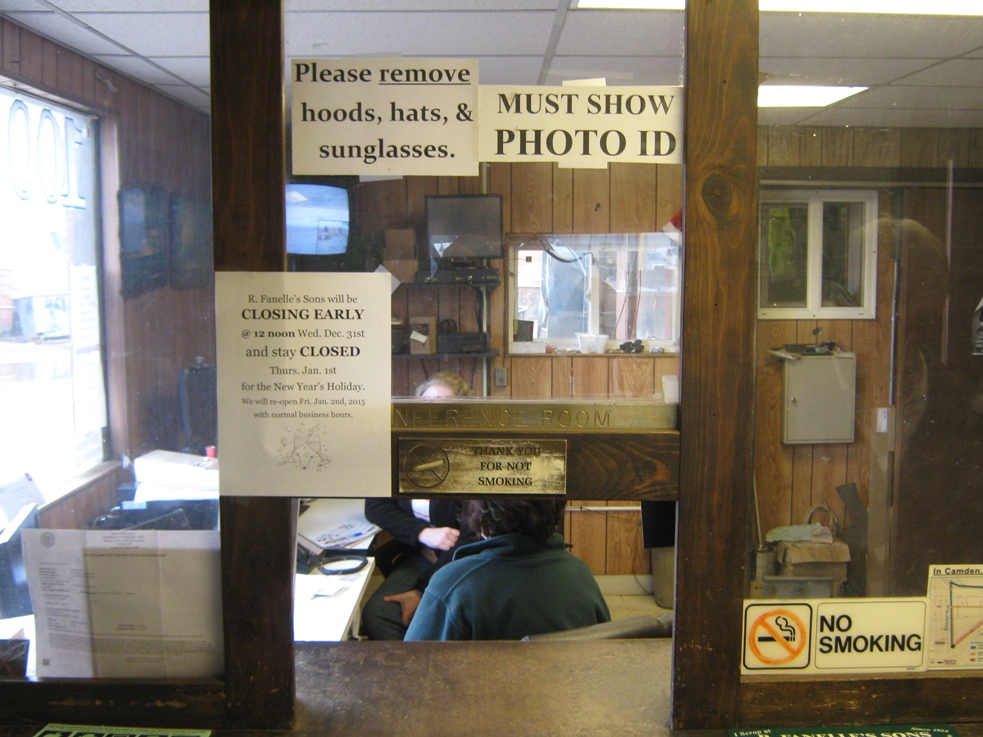
Yes, they get a good look at your face here.
Fanelle does concede that theft is a problem. Over the years he has seen some elaborate schemes, like the Locustwood cemetery thefts that were cited as a reason for the legislation.
“A fellow shows up here one day from a local cemetery, and he had all this brass. We said we don’t take it. He says, we’re doing something at the cemetery, we’re replacing these urns. I said if you have some kind of letter from the cemetery, I need something like that.
“He came back; he had a letter and the cemetery truck, so we bought them. He came in again, and again, over a series of months. He’d come in with the truck, and he was on his two-way radio talking with guys at the cemetery, saying we have a funeral at plot so-and-so today. So we thought everything was legit.
“I get a phone call from the Courier-Post one day; someone was doing an article about theft in cemeteries. He started to rattle down names, Calvary, Cole Cemetery. I said wait a minute, before you get to Locustwood, you need to know, they’ve been scrapping stuff. I said it was a project they were doing.
“Next day it ends up in the paper, over 200 urns stolen from Locustwood. When I read the paper, I hit the roof. I called Joe Vitarelli in Cherry Hill; I said you better get down here. So he came down, I explained the story to him, and they got the kid.
“We were led to believe what these things were, and when we heard there was a problem, we went right to the police. We have to be on our guard, we could get in serious trouble.”
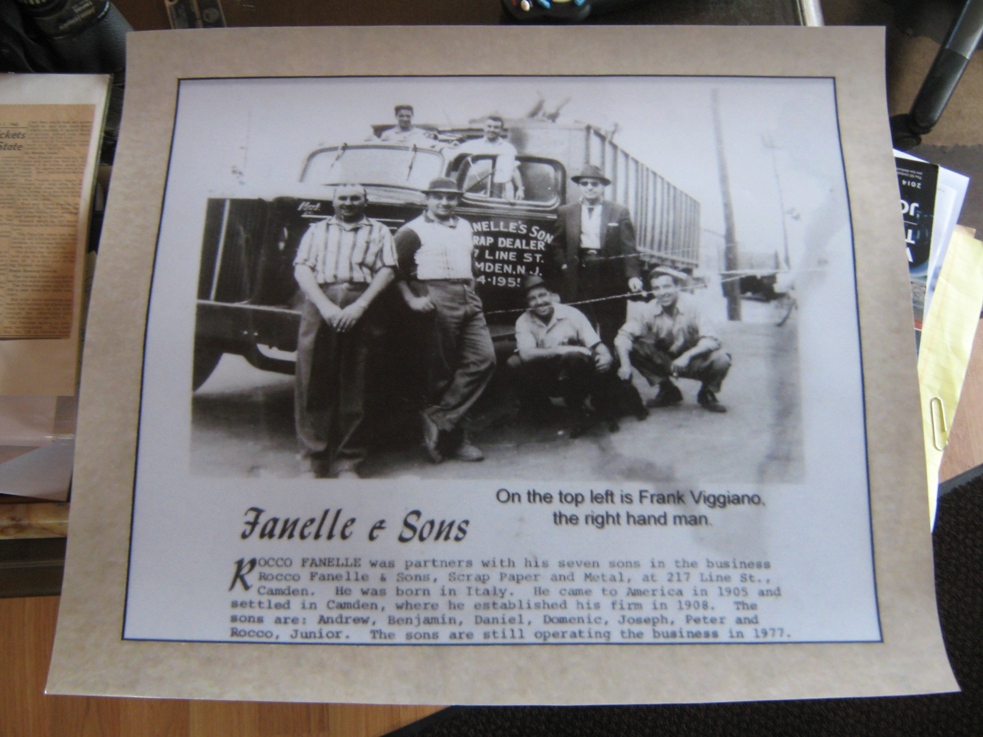
The early days of Fanelle family community service.
Part of the job, but it has its rewards. Fanelle mentions his recent involvement with the S.S. United States Conservancy, in their effort to preserve the 62-year-old ocean liner that once broke the trans-Atlantic speed record. The S.S. United States has been docked at Pier 82 in Philadelphia for 18 years now, but it’s not cheap to keep her there.
“We harvested a lot of metal out of the hull of the ship, bought some propellers, to keep the conservancy able to maintain the ship in Philadelphia. I think it’s been a win-win for both of us. I like to feel as though we’ve supported their cause the past three or four years. That’s a big thing; it’s a lot of notoriety.”
All in a day’s work for Tom Fanelle and his crew, some of whom have been there almost as long as Fanelle, who’s been in the business 45 years now. He jokes about having employees that say 15-20 years there is nothing. Employees are respected as much as customers.
It’s been that way at R. Fanelle’s Sons for a century now.
When asked about the secret to his shop’s continued success, Fanelle keeps it simple and obvious. Treat customers right.
“We go to the end of the world to service our customers. We do whatever we can to make things easy for our customers. People enjoy doing business with us. They’re comfortable with us.
“You can beat somebody and cheat them one time, or you can treat them good and have them ten times. My father used to tell me that.”
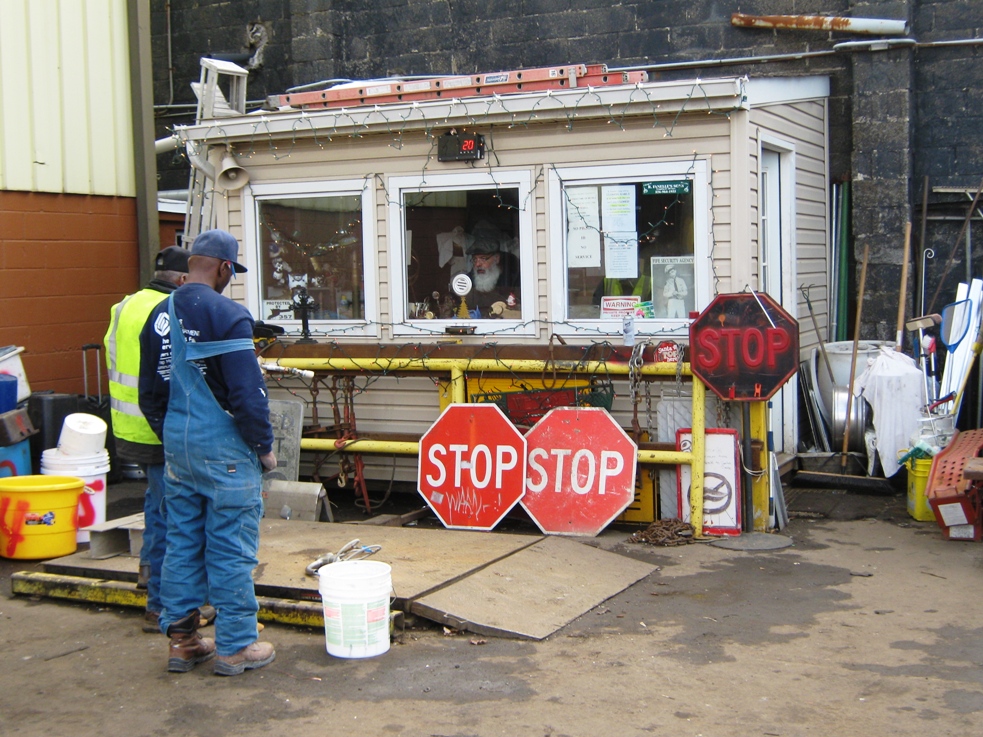
Yes, we’ll weigh your scrap metal for you.
Want to Try Scrapping?
There is a link on the R. Fanelle’s Sons website to the iScrap App, a free download that displays market prices of common metals, a listing of all of the different types of metals that get recycled, and tips and news stories for people interested in scrapping.
The glossary of metals includes pictures and descriptions of ferrous and non-ferrous materials, but there’s also an interesting list of electronics: cell phones, backup batteries, speakers, and various parts of PCs, including mice and towers, are all things that can often be brought to a scrap yard for cash.
The app also contains forums where people can share their scrapping tips – one poster described his experience collecting rotting mobile homes and RVs from people’s backyards in exchange for the owner’s paying for the dumpster to carry it to the scrap yard. He claimed the work brought him $10,000 in three months.
As if that weren’t enough, the app includes scrapping news, with more helpful articles for scrappers. Stories include information on the scrap value of forklifts, a video with tips for scrapping cellphones and PC motherboards, and trends in the prices of scrap metals.
Interested scrappers can download it at iscrapapp.com.
Frequently Stolen Metal Items
Metal thefts have increased with the prices of metal, and as Fanelle notes, often times thefts are related to drug usage. Some of the more common items in thieves’ crosshairs include:
Manhole covers: A CNN Money story tells of officials in Beijing, China, replacing the manhole covers with non-recyclable, non-metal materials, after the city lost nearly half of its 600,000 manhole covers to theft. In May of 2008, Newsweek reported increasing manhole cover thefts In Philadelphia, Chicago, and Greensboro, NC.
Copper wire: copper prices increased dramatically between 2002-2007, so much that a black market formed to steal copper wire from phone companies and railroads. In 2008 the Seattle Post-Intelligencer reported the theft of a 3,000 pound copper bell from a Buddhist temple; in 2009 the Oregonian reported the story of a man severely burning himself attempting to steal copper wire from a high voltage box.
Cemetery markers: The Courier-Post broke the story of urns being stolen from several local cemeteries including Locustwood; 100 vases were stolen from Brockton Union Cemetery in Boston. In April of 2008, over 1,000 bronze markers were stolen from a concentration camp cemetery in the Czech Republic.
Good For Your Planet’s Health
According to the Institute of Scrap Metal Recycling Industries (ISRI), the reduction in CO2 emissions from worldwide scrap recycling totals approximately 500 million tons each year. On ISRI’s website you can find a fact sheet that lists the gasoline energy equivalent of recycling certain materials, and the resulting reduction in greenhouse gas.
For example:
Recycling one car = the energy equivalent of 500 gallons of gasoline = 8,811 lbs. of greenhouse gas emissions
Recycling one refrigerator = the energy equivalent of 36 gallons of gasoline = 566 lbs. of greenhouse gas emissions
Recycling ten lbs. of cardboard = the energy equivalent of 2 gallons of gasoline = 40 lbs. of greenhouse gas emissions
This isn’t to say you would be able to drive 50 miles on ten lbs. of cardboard, but that doesn’t make it landfill material.
Source: www.isri.org




















